The Georgetown Alliance of Graduate Employees (GAGE) claims university administrators are stalling ongoing arbitration proceedings, which need to be completed before the union can negotiate further COVID-19 protections for graduate workers.
GAGE previously announced it was pursuing expedited arbitration with the university over ongoing bargaining disputes on Sept. 18. Under GAGE’s contract, once arbitration paperwork is filed, the university can take a maximum of 15 working days to respond and an additional five working days to propose an arbitrator. Administrators took all 15 days to respond to GAGE’s request for arbitration and another four days to complete the second step, emailing union officers a statement agreeing to expedited arbitration on Oct. 13, nearly a month after the process began.
Arbitration is a process through which workers and employers use a third-party to resolve a dispute over the interpretation of a collective bargaining agreement, in this case, the union contract signed by GAGE and the administration this May after a year and a half of negotiations. In mid-July, GAGE entered bargaining meetings with the administration over its Fall 2020 reopening plan, a plan which many union members saw as inadequate when it came to COVID-19 protections for graduate workers and international students. An agreement has still not been reached, two months after the semester started.
GAGE President Jewel Tomasula (PHD ‘24) expressed dismay at the length of time the university took to respond to the arbitration request, saying expedited arbitration had already been informally agreed to by administrators last month. “I’m disappointed that they took the whole 15 working days to tell us nothing different than what they told us in the September 17th meeting,” she said.
According to Ari Janoff (PHD ‘24), the union’s grievance officer, the university’s delays are endangering vulnerable graduate workers in the middle of a pandemic. “The COVID pandemic is happening right now,” she said. “We definitely feel like they’re trying to run out the clock and not being more responsive.”
“I understand that they need to talk to all of their stakeholders and bureaucracy is complicated,” Janoff added. “But they should be able to get back to us quicker on this. It’s super important, especially since people are losing their jobs now.”
Tomasula, too, emphasized the importance of moving quickly through arbitration and securing GAGE’s demands for additional graduate worker protections.
“A lot of this is wanting to prevent people being in terrible situations and letting people know that if something bad happens to them they will have help. That’s a motivation behind us wanting to bring an emergency paid sick leave proposal specifically for hourly workers,” she said.
GAGE claims the administration unilaterally withdrew from all negotiations surrounding four demands: to guarantee remote work for all graduate workers regardless of location, provide paid sick leave for hourly graduate workers and TAs who contract COVID-19, cover the cost of protective equipment and COVID-19 testing for graduate workers on campus, and protect the legal rights of graduate workers under the administration’s Community Compact.
According to Tomasula and Janoff, the university claimed GAGE’s pandemic concerns were already addressed in their contract, and that the union had no ability to bargain over reopening plans. Yet, administrators barely addressed COVID-19 when negotiating the union contract, Janoff said. “They rushed us through the end of bargaining and wanted an agreement as quickly as possible so we wouldn’t have to add COVID protections.”
As a result, Tomasula said, the university is “gaslighting” when it says GAGE agreed to the contract’s healthcare and sick leave provisions with COVID-19 in mind. “We did not think that it would continue through the fall and they certainly didn’t either, so it’s really disingenuous to say that we were thinking about COVID when we signed a collective bargaining agreement on May 1st.”
Responding to the administrators’ position that they can make reopening decisions without input from GAGE, Tomasula argued they were violating the very concept of a union bargaining agreement, which guarantees input from workers. “They are saying that it’s their management right to make these decisions, so they have the right to just keep them as unilateral policy,” she said. “And we just fundamentally disagree with that.”
To Janoff, the university’s rationale for calling off negotiations with GAGE suggests they never intended to bargain in good faith in either the summer or fall. “You’re not allowed to unilaterally end bargaining meetings. That’s not how bargaining works,” she stated.
“The idea that we don’t have a say at the table is incorrect. We do have the right to bargain over the impact of policy.”
Both GAGE officers criticized what they viewed as the administration’s lack of respect toward the union and the bargaining contract agreed upon by both parties. Moreover, Janoff stated that the university was once again ignoring the concerns of graduate workers. “It’s mind-boggling that they can say, ‘We think your concerns are covered in existing policy,’ when existing policy without the input of graduate workers is why we had so many problems that needed to be resolved by the contract in the first place,” she explained.
Tomasula expanded further upon the discrepancy between the university’s messaging and its actions. “Right now, they keep saying this is an unprecedented crisis,” she said. “Their own emails say that this is unprecedented. And when something’s unprecedented, in an unprecedented situation, this union rights article means nothing?”
In an email to the Voice, a university spokesperson stated that the administration would honor the expedited arbitration process.
“Georgetown is working cooperatively with GAGE-AFT to resolve this grievance through arbitration,” they wrote. “As requested by GAGE, Georgetown has agreed to an expedited arbitration process. We value GAGE-AFT’s views and have made a good faith effort to address the issues its members have raised, which is reflected in the number of changes that we have made to these policies.”
Janoff, however, argued the university’s response is not enough. “They’re cooperating at a bare minimum,” she said. “Whatever they’re forced to do by the contract they’ll do, but they’re definitely not going out of their way to expedite this process. That doesn’t feel great. It would be nice if they would show that they were willing to resolve this quickly.”
Echoing this sentiment, Tomasula said the university’s behavior “seems to be in line with their thing just trivializing the experience that we have, the uncertainty that we’re experiencing as graduate workers.”
“We’re living with their injustice and knowing that they’re failing us.”








[…] The Georgetown Voice reports… […]